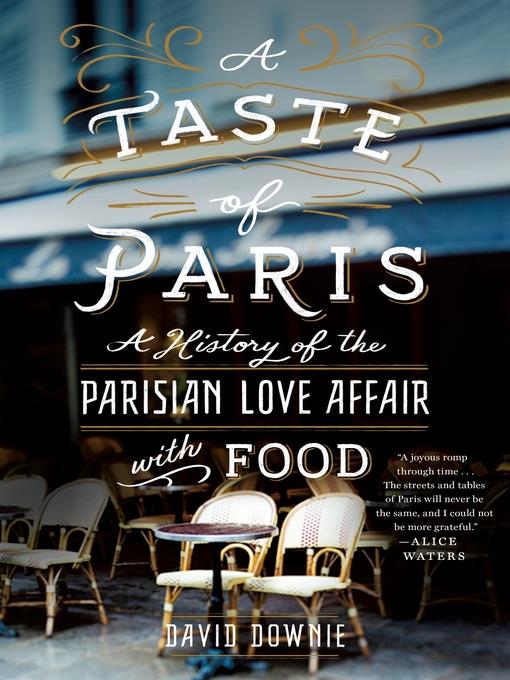
A Taste of Paris
A History of the Parisian Love Affair with Food
کتاب های مرتبط
- اطلاعات
- نقد و بررسی
- دیدگاه کاربران
نقد و بررسی

July 1, 2017
A Francophile takes a spirited jaunt through French history, focused on food.A resident of Paris since 1986, Downie (A Passion for Paris: Romanticism and Romance in the City of Light, 2015, etc.), whose enthusiasm for food and travel has resulted in more than a dozen books, offers a loving, celebratory, and irreverent look at French eating habits, from ancient times to the present. Short, pithy chapters brim with quirky details: frog legs, so quintessentially French, were "beloved of the centurions and gourmets of antiquity"; mustard, too, was a Roman favorite. Not until the 17th century did dining rooms exist in Parisian residences, and knives and forks came late to the French table. In the court of Louis XIV, diners ate "quickly and greedily," licking their fingers with pleasure. Meals were abundant: "everyone but the poorest devoured unimaginable quantities of meat," including veal, mutton, beef, and various species of bird, along with eel and fish. In the 1700s, French cuisine became "the unofficial state religion," and "nouvelle cuisine" was invented, with "theorists, chemists, chefs, philosophers," and assorted other experts engaged in parsing the meaning of taste "and the differences between gluttons, gourmets, gastronomes, and other varieties of eaters." The first restaurants appeared in the mid-1700s; by 1789, there were about 50, which burgeoned to 3,000 by 1814. Downie recounts the culinary influence of Grimod de la Reyniere and his more famous contemporary Jean Anthelme Brillat-Savarin, author of many food-related aphorisms. "The destiny of nations," he wrote, "depends on the way they feed themselves." The author also offers capsule reviews--not always favorable--of some of Paris' 10,000 restaurants. He is not a fan of pretension, noise, corporate ownership, stratospheric prices, or what he calls "karaoke cuisine," characterized by "industrial sauce," microwaved entrees, "multiple courses for under $20," and "pink and familiar decor." His disdain is especially harsh regarding "super-bobo" eateries with "could-be-anywhere cooking." A zesty, entertaining romp through the landscape of French food.
COPYRIGHT(2017) Kirkus Reviews, ALL RIGHTS RESERVED.

August 1, 2017
Downie, an expat from San Francisco living in Europe and author of several travel and food books (Paris, Paris; A Passion for Paris), tells the story of France through the country's relationship with food, while also providing a contemporary guide to the world of Parisian culinary establishments. The table of contents is written in the form of a menu and the author traces his adopted city's food history from 53 BCE. He regales readers with his adventures with food and drink from the day he first arrived in Paris and addresses all aspects of French cuisine, from seeds to planting to processing to serving. We learn how food reflected the culture and the eating habits of such notables as Julius Caesar, Charlemagne, Madame de Pompadour, Voltaire, Zola, Benjamin Franklin, and most of the French royalty. Downie provides historical and current information for foodies and fashionistas in Paris through informative and witty vignettes, accompanied with illustrations of woodcuts and postcards. VERDICT A great companion for any French adventurer as well as historians and food buffs.--Melinda Stivers Leach, Wondervu, CO
Copyright 2017 Library Journal, LLC Used with permission.

October 16, 2017
Downie (A Passion for Paris) blends exhaustive research and personal experience in this delightful history of one of the culinary capitals of the world. The acclaimed food and travel writer packs in 92 breezy essays that cover topics ranging from pre-Christian times up through the nouvelle cuisine of the 1970s and the alleged decline of present-day French cuisine. Downie expands on dozens of topics, including the French fascination with foie gras, the Sweeney Todd legend (which was based on real events in Paris “in which the barber and the meat pie maker next door carry on a gruesome trade”), and the origins of the country’s love for food. He shares primary documents such as the menu at Queen Catarina’s 1549 coronation and the original 1691 crème brûlée recipe, and explores the influences of a wide and entertaining array of historical figures including the gluttonous Louis XIV, the prerevolutionary potato promoter Parmentier, and medieval cookbook author Taillevent. Most impressively, Downie relishes in debunking myths about French culinary exceptionalism (Curnonsky, one of Paris’s best-known gastronomists in the early 20th century, “only got into the gastro-journalism racket after a taste-bud-stimulating voyage to China”) while unabashedly proclaiming his adoration for French culture and history in and out of the kitchen. Readers don’t have to be foodies to get the flavor of the French character in this delightful, thoroughly researched culinary history. Photos.

August 1, 2017
Avid Francophile Downie (A Passion for Paris, 2015) appears to be deeply acquainted with every Parisian bypath and companionably guides the reader through them with an emphasis on culinary history as well as contemporary restaurants in which the influence of the past can be found. Starting with the years during which the Romans dominated the little town that would grow into Paris, he moves through the ages, lingering affectionately in the eighteenth century and tossing in literary references as well as more strictly food-related ones. An unapologetic gourmand, Downie enjoys spending time browsing through old cookbooks, my mouth watering no matter how bizarre the recipe, and particularly relishes detailing elaborate, multicourse menus. While Downie may not be temperamentally suited for writing a strictly chronological history, most readers will enjoy his free associative jumps into seemingly unrelated areas of French history and life, and no one will mistake his love for his adopted country.(Reprinted with permission of Booklist, copyright 2017, American Library Association.)

























دیدگاه کاربران